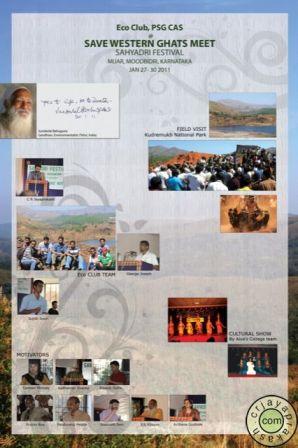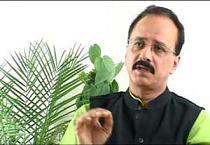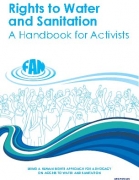/topics/governance
Governance
Mapping ecologically sensitive, significant and salient areas of Western Ghats: Proposed protocols and methodology by Western Ghats Ecology Expert Panel of the MoEF - An article from Current Science
Posted on 02 Feb, 2011 08:11 PMThe Western Ghats Ecology Expert Panel (WGEEP) of the Ministry of Environment and Forests, Government of India (GOI) had been asked to identify ESAs along the Western Ghats, and to suggest how to manage them. The concept of ESAs has been extensively discussed in the literature. Several ESAs have been set up in India over the last 22 years under the Environment Protection Act, 1986, and a GOI committee under the chairmanship of Pranob Sen has proposed certain criteria for identification of ESAs.
"Recommendations on water and sanitation services to urban poor"
Posted on 02 Feb, 2011 05:31 PMThe India WASH Forum newsletter for January 2011. It is an open platform for engagement on contemporary issues, for an independent credible voice in the water, sanitation and hygiene sector.
- Recommendations on water and sanitation services to urban poor
The group came up with a list of prioritised issues that need immediate attention if the urban poor were to be provided with sustainable and equitable water and sanitation services. - Water resources are under stress of depletion as well as denial of access for the poor
Drinking water needs are met primarily from ground water. Except for the large metros that suck away water from rivers, most small towns in India depend on ground water supply.
"Urban sanitation in India: life after Common Wealth Games"
Posted on 02 Feb, 2011 05:16 PMThe India WASH Forum newsletter for November 2010. It is an open platform for engagement on contemporary issues, for an independent credible voice in the water, sanitation and hygiene sector.
- Recent estimates of drinking water and sanitation status of India
As per the estimate, India has achieved a coverage of 68% rural population having access to an individual household toilet. - Urban sanitation in India: life after Common Wealth Games
The Commonwealth Games generated a media blitz recently. Unfortunately, instead of highlighting the sorry state of sanitation in India, the issue was trivialized in the media.
A report on Save Western Ghats Meet held at Moodbidri, Mangalore between 27th -30th January 2011
Posted on 02 Feb, 2011 03:11 PM
Corruption has fuelled India's economic growth - OneWorld South Asia interview with Devinder Sharma
Posted on 01 Feb, 2011 05:18 PM
Multinational Geomatics Capacity Building - Achievements and Challenges, Indian Institute of Remote Sensing, 7th - 8th April, 2011, Dehradun
Posted on 01 Feb, 2011 02:33 PMOrganizer: Indian Institute of Remote Sensing
Venue:Indian Institute of Remote Sensing, Dehradun
Topics:
- Geomatics training and Education in India and International Level
- Cross Border Education initiatives and achievements
- Institutional and legal frameworks at national and International level
Grassroutes 2011, Road-trips for Social Change
Posted on 01 Feb, 2011 02:09 PM Grassroutes is a Fellowship Program that supports outstanding and passionate young people to go on road-trips for social change. The select group of young people will travel across India, meet change-makers, work with social ventures, learn about developmental issues, live with the community and return with stories of social change, which will enable them to inspire a larger community into taking action.
Grassroutes is a Fellowship Program that supports outstanding and passionate young people to go on road-trips for social change. The select group of young people will travel across India, meet change-makers, work with social ventures, learn about developmental issues, live with the community and return with stories of social change, which will enable them to inspire a larger community into taking action.
Private water supply, sanitation and hydropower projects and reforms projects involving privatisation and commercialisation in India - Database by Manthan Adhyayan Kendra
Posted on 31 Jan, 2011 11:16 PMThe database has been developed as a part of Manthan Adhyayan Kendra's engagement in comprehensive monitoring, research and analysis of policies, programs and projects relating to privatisation/commercialisation of water sector.
Right to water and sanitation - A handbook for activists by Freshwater Action Network (FAN) Global
Posted on 31 Jan, 2011 10:11 PM With tihs, they can improve water and sanitation service regulation and provision at international, national and local levels. Directed primarily at community groups, human rights NGOs, rights-based development practitioners and aid workers, this handbook aims to strengthen human rights-based advocacy by providing innovative and practical suggestions that activists and organisations can use in their work. It also acts as a resource guide for finding further information.
With tihs, they can improve water and sanitation service regulation and provision at international, national and local levels. Directed primarily at community groups, human rights NGOs, rights-based development practitioners and aid workers, this handbook aims to strengthen human rights-based advocacy by providing innovative and practical suggestions that activists and organisations can use in their work. It also acts as a resource guide for finding further information.
Water and sanitation are essential for living a healthy life with dignity. However, around a billion people across the world lack access to a safe and sufficient water supply to cover their basic needs. Over 2.5 billion people lack access to adequate sanitation and nearly 1.2 billion face the indignity of open defecation every day.
The Millennium Development Goal (MDG) target to halve the proportion of people without sustainable access to safe drinking water and basic sanitation by 2015 is seriously off track, with sanitation severely lagging behind. For example, estimates suggest that at current rates of progress, sub-Saharan Africa will miss the MDG water target by about 25 years, while the sanitation target may not be reached until well into the 22nd century.
Urban water pricing: Setting the stage for reforms – A study by National Institute of Public Finance Policy
Posted on 31 Jan, 2011 08:22 PMIt underlines, in this regard, the importance of a responsible municipal fiscal and financial system, simplification of existing water pricing and tariff structures, and regulatory mechanisms which are able to balance the interests of the producers and consumers of urban services.





